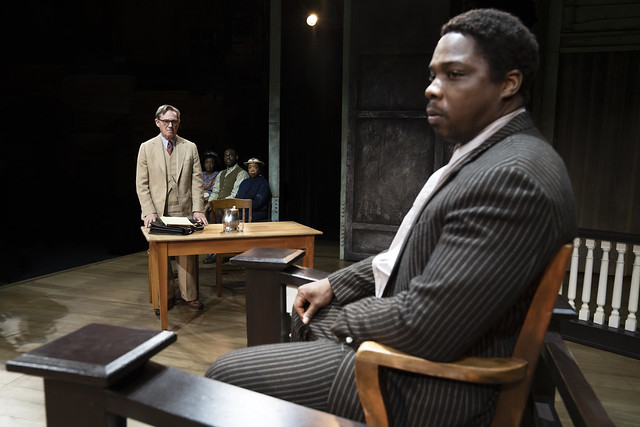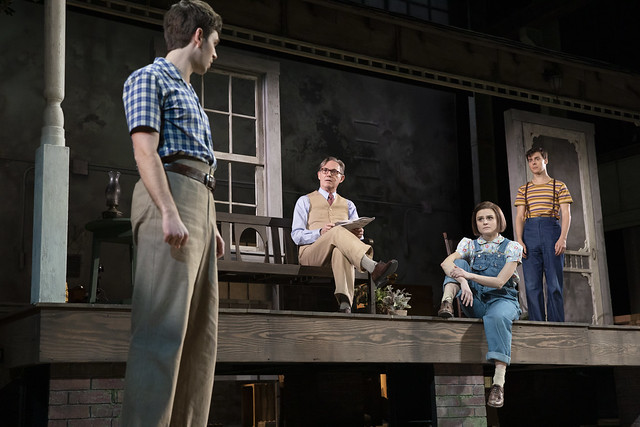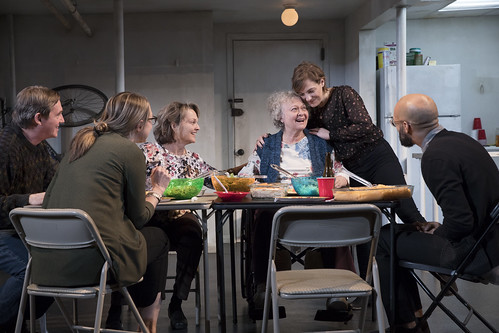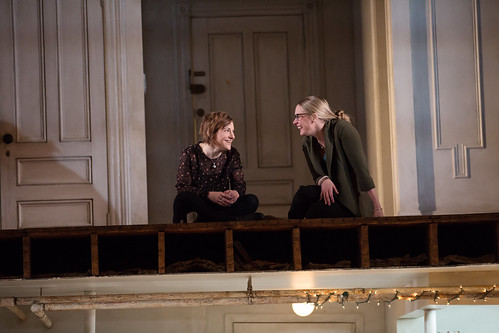
ABOVE: Richard Thomas (left) is Atticus Finch and Yaegel T. Welch is Tom Robinson in Aaron Sorkin’s stage adaptation of the Harper Lee novel To Kill a Mockingbird at the Golden Gate Theatre as part of the BroadwaySF season. BELOW: (from left) Justin Mark is Jem Finch, Thomas is Atticus Finch, Melanie Moore is Scout Finch and Steven Lee Johnson is Dill Harris. Photos by Julieta Cervantes
It would be impossible – some might even call it a sin – to kill To Kill a Mockingbird. Like it or not, Harper Lee’s 1960 novel has become our American story – a novel we revere and teach to children, a movie we idolize, a work of art that we feel pushing us to do the right thing. The book has been banned, debated, cast off as white-savior hokum and generally accepted as a way we address the deeply complicated history of race in America as mainstream entertainment.
And being part of the mainstream, theater has not been left out of the Mockingbird nest. For the last 50 years or so, there had been a serviceable stage adaptation of the novel that was faithfully performed around the world (thank you for your service, Christopher Sergel). That version was essentially erased when Aaron Sorkin, of “The West Wing”/A Few Good Men/The Social Network fame, decided to get into the Mockingbird game with an all-new stage adaptation, which opened on Broadway in 2018.
That’s the version of To Kill a Mockingbird that is now on tour and making its Bay Area premiere at the Golden Gate Theatre as part of the BroadwaySF season. If you are already a fan of Sorkin’s work as either a writer or director, you know you’ll love his attempt to pull Lee’s novel into a post-George Floyd world where it seems every bigoted, violent, closed-minded townsperson from the story makes up nearly half of our American electorate and its halls of power.
If you’re a Mockingbird loyalist, you may not be as thrilled with Sorkin’s changes, especially the way he pulls Atticus Finch down off his pedestal and makes him more of a flesh-and-blood human being. He also makes Atticus more of the play’s focal point than his young daughter, Scout, who is the narrator of the novel. But if you know Sorkin, you know how much sense that makes. Sorkin loves a trial (see A Few Good Men and The Trial of the Chicago 7) – it is theater and religion rolled into one – and rather than leave the pivotal trial in Mockingbird to the end, he starts there and then cannily shifts back and forth through time as he ratchets up tension leading to the jury’s verdict.
There’s so much that’s just plain smart about Sorkin’s approach. He has streamlined the plot (for instance, there’s no Aunt Alexandra, Atticus’ sister) and tried to give the Black characters, like the Finch maid Calpurnia, more weight in the story. In fact, it’s Calpurnia who has some of the show’s most trenchant lines and makes the greatest effort to show Atticus that his optimism, respect and faith that there’s good in everyone could be blinding him to reality and actually causing damage.
In this version, Atticus does not remain unruffled. He feels like he knows about his fellow townsfolk to know that they’ll ultimately do the right thing, and if you just imagine being in the skin of those with whom you disagree, you’ll be less prone to hate and more inclined to understanding and neighborly love. But then the catastrophic trial in which he’s involved as a defender grows more and more intense, and he can’t quite feel solid ground under his idealism.
That would be an interesting exploration in the 1930s, when the story takes place, in the 1960s, when Lee shared her story and now, when animosity and lies, especially around issues of race, divide the country as powerfully as they ever have.
Sorkin’s restructuring of the story works well for Atticus, and when he gives the character (played on tour by the superb Richard Thomas) doubt and anger and optimism, the mix is emotional and quite visceral. The element of the story that works less well on stage involves the children – Atticus’ kids, Scout (Melanie Moore) and Jem (Justin Mark), and their summer friend Dill (Steven Lee Johnson). Usually I have an aversion to adults playing children, but here, the performers are good enough to keep the cloying cuteness at bay. But their part of the story, especially as the show winds down with an act of violence and an act of courage, doesn’t have the same weight because the best parts of the show don’t really involve them. Still, it’s essential that Lee’s story involve the opening of a child’s eyes to the reality of the world – especially these children, who are living in segregated Alabama. And it’s vital that the kids infuse her story with the hope that children are going to be better and do better than their parents.
That all still comes across in director Bartlett Sher’s fluid, beautifully textured production, but it’s just not as powerful. The racial inequality, the stupid power of mob rule and the failure of the judicial system are vivid and gut wrenching here. But it seems that in the more realistic world of this Mockingbird, optimism and hope will suffer the law of diminishing returns.
FOR MORE INFORMATION
Harper Lee’s To Kill a Mockingbird continues through Oct. 9 at the Golden Gate Theatre, 1 Taylor St., San Francisco as part of the BroadwaySF season. Running time: 2 hours, 35 minutes with one intermission. Tickets are $56-$256. Call 888-746-1799 or visit broadwaysf.com.



